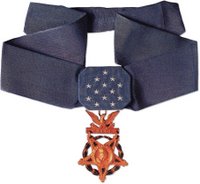Lieutenant Colonel, US Army Air Corps
Born: 8 April 1913, Canton, China
Died: 18 March 1995, Bay Pines, Florida
 Citation: For conspicuous gallantry and intrepidity above and beyond the call of duty in action with the enemy near Oschersleben, Germany, on 11 January 1944. On that day Col. Howard was the leader of a group of P51 aircraft providing support for a heavy bomber formation on a long-range mission deep in enemy territory. As Col. Howard's group met the bombers in the target area the bomber force was attacked by numerous enemy fighters. Col. Howard, with his group, at once engaged the enemy and himself destroyed a German ME. 110. As a result of this attack Col. Howard lost contact with his group, and at once returned to the level of the bomber formation. He then saw that the bombers were being heavily attacked by enemy airplanes and that no other friendly fighters were at hand. While Col. Howard could have waited to attempt to assemble his group before engaging the enemy, he chose instead to attack single-handed a formation of more than 30 German airplanes. With utter disregard for his own safety he immediately pressed home determined attacks for some 30 minutes, during which time he destroyed 3 enemy airplanes and probably destroyed and damaged others. Toward the end of this engagement 3 of his guns went out of action and his fuel supply was becoming dangerously low. Despite these handicaps and the almost insuperable odds against him, Col. Howard continued his aggressive action in an attempt to protect the bombers from the numerous fighters. His skill, courage, and intrepidity on this occasion set an example of heroism which will be an inspiration to the U.S. Armed Forces.
Citation: For conspicuous gallantry and intrepidity above and beyond the call of duty in action with the enemy near Oschersleben, Germany, on 11 January 1944. On that day Col. Howard was the leader of a group of P51 aircraft providing support for a heavy bomber formation on a long-range mission deep in enemy territory. As Col. Howard's group met the bombers in the target area the bomber force was attacked by numerous enemy fighters. Col. Howard, with his group, at once engaged the enemy and himself destroyed a German ME. 110. As a result of this attack Col. Howard lost contact with his group, and at once returned to the level of the bomber formation. He then saw that the bombers were being heavily attacked by enemy airplanes and that no other friendly fighters were at hand. While Col. Howard could have waited to attempt to assemble his group before engaging the enemy, he chose instead to attack single-handed a formation of more than 30 German airplanes. With utter disregard for his own safety he immediately pressed home determined attacks for some 30 minutes, during which time he destroyed 3 enemy airplanes and probably destroyed and damaged others. Toward the end of this engagement 3 of his guns went out of action and his fuel supply was becoming dangerously low. Despite these handicaps and the almost insuperable odds against him, Col. Howard continued his aggressive action in an attempt to protect the bombers from the numerous fighters. His skill, courage, and intrepidity on this occasion set an example of heroism which will be an inspiration to the U.S. Armed Forces.Note: Howard was originally a Navy pilot, flying Grumman F3F-1 fighters aboard USS Enterprise (CV 6). He left the Navy in June of 1941 to join the American Volunteer Group (AVG) - the Flying Tigers. Flying a Curtiss P-40 Warhawk, he completed 56 missions and was credited with shooting down six Japanese aircraft. After the Flying Tigers were officially absorbed by the Army Air Corps in 1942, he returned to the United States and joined the Army Air Corps.
His memoir, Roar of the Tiger, was published in 1991.











No comments:
Post a Comment